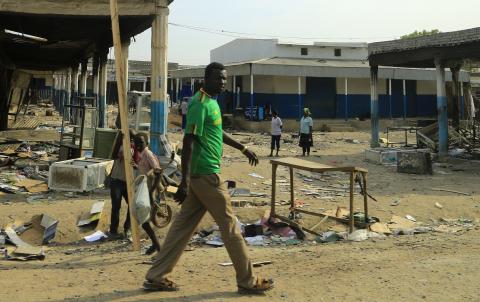Advertisement
South Sudan Government, Rebels Set For New Year's Day Talks
JUBA (Reuters) - South Sudan's government and rebels are set for New Year's Day peace talks in Ethiopia's capital, Addis Ababa, to thrash out a ceasefire to end weeks of ethnic bloodletting in the world's newest state.
Both sides agreed to a ceasefire on Tuesday, mediators said, but fighting between government troops and militias loyal to former Vice President Riek Machar raged in Bor, the capital of the vast Jonglei state and site of an ethnic massacre in 1991.
"I'm worried that the continued fighting in Bor might scupper the start of these talks," said Ethiopian Foreign Minister Dr. Tedros Adhanom, who is chairman of the regional Intergovernmental Authority on Development (IGAD) bloc that is mediating the talks.
"Hopefully both delegations will arrive tomorrow (Wednesday), start the talks and settle this problem once and for all," Adhanom told Reuters by phone from Addis Ababa.
Western and regional powers have pushed both sides to end the fighting that has killed at least 1,000 people, cut South Sudan's oil output and raised fears of a full-blown civil war in the heart of a fragile region.
It was not clear who controlled Bor on Tuesday night after a day of heavy fighting that started at dawn in the dusty town, which was held by Machar's rebels for a few days at the start of the conflict. Nearly 200,000 civilians have been displaced.
The United Nations Mission in South Sudan said ethnic-based atrocities, often carried out against civilians by uniformed men, have taken place throughout the newly independent South Sudan.
"This can lead to a perpetual cycle of violence that can destroy the fabric of the new nation," the United Nations warned in a statement. About 9,000 civilians are seeking refuge at the U.N. base in Bor.
The clashes erupted on December 15 with fighting among soldiers in Juba. The violence quickly spread to half of the country's 10
states, dividing the country along the ethnic lines of Machar's Nuer group and President Salva Kiir's Dinkas.
Kiir has accused his long-term political rival Machar, who he sacked in July, of starting the fighting in an effort to seize power.
Machar has denied the charge, but he has taken to the bush and has acknowledged leading soldiers battling the government. There have been conflicting reports on whether Machar was in full control of the Nuer "White Army" militia fighting in Bor, though on Tuesday he told the BBC they were part of his forces.
The fighting has revived memories of the factionalism in the 1990s within the Sudan People's Liberation Movement, the group that fought Sudan's army in the north for two decades. Machar led a splinter faction and fighters loyal to him massacred Dinkas in Bor.
Both the government and the rebels said earlier on Tuesday that they were sending teams to start talks in neighboring Ethiopia, though Machar told the BBC on Tuesday that he was not prepared to lay down weapons.
The U.S. special envoy to South Sudan, Donald Booth, said the commitment to send negotiators was an "important first step" towards a negotiated settlement.
"CATASTROPHIC CONDITIONS"
Ugandan President Yoweri Museveni said on Monday that East African countries had agreed to move in and defeat Machar if he rejected the ceasefire offer, threatening to turn the fighting into a regional conflict. No other countries have confirmed any such an agreement.
"The town is still partly in our hands and partly in the hands of the rebels," Mayor Nhial Majak Nhial told Reuters on Tuesday from the government's military headquarters inside Bor, 190 km (120 miles) north of Juba by road.
Medical charity Medecins Sans Frontieres (MSF) said about 70,000 civilians had fled Bor and sought refuge in the town of Awerial in neighboring Lakes state, with no access to food, clean water or shelter. Others were hiding in swamps.
"Living conditions are verging on the catastrophic," MSF said.
According to United Nations figures, fighting across the country has displaced at least 180,000 people, including 75,000 who are seeking refuge inside U.N. bases.
The African Union said late on Monday it was dismayed and disappointed by the bloodletting that came two years after South Sudan won independence from its northern neighbor, Sudan.
The AU's Peace and Security Council said it would "take appropriate measures, including targeted sanctions, against all those who incite violence, including along ethnic lines, continue hostilities (and) undermine the envisaged inclusive dialogue."
(Additional reporting by Drazen Jorgic and Richard Lough in Nairobi; Writing by Richard Lough; Editing by Andrew Heavens, Toni Reinhold)



















Add new comment